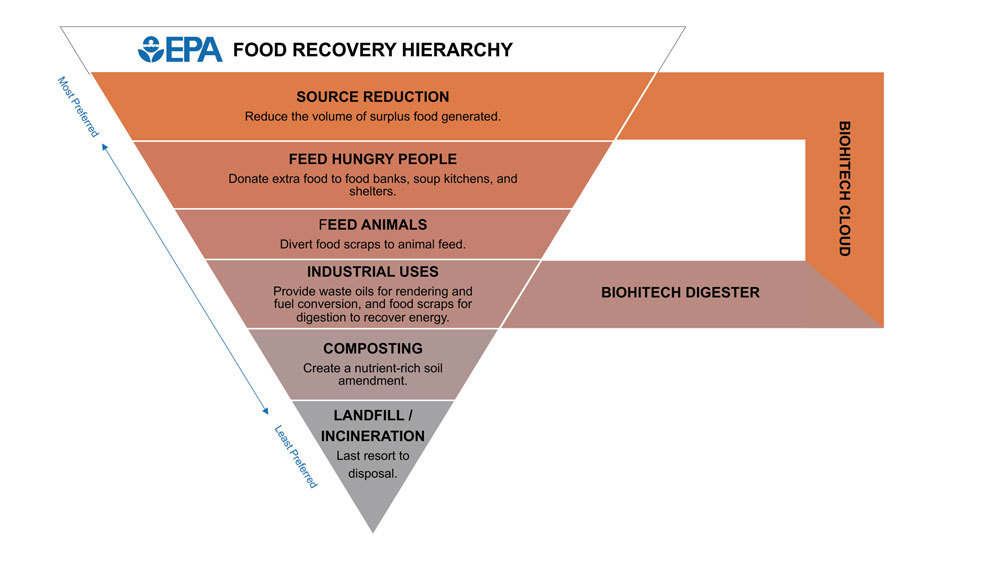Innovation and waste tracking are critical in the prevention of food waste. Is now a perfect time to make changes?
By Lisa Giovannielli
As businesses and companies begin to reopen and restart, the sustainability programs that took months and even years to develop and put in motion should not be moved to the back seat. These last few months have thrown us all off course and as this time comes to an end, these important programs will need to lean on technology solutions to help get those objectives back on track.
Outdated Solutions
Sustainability programs come in many forms in hopes to solve for a specific problem. The common misunderstanding of what the problem is leads us to reach for limited and outdated solutions that are just band aids, not getting to the core of the real problem. The fact that Americans go hungry in the face of overproduction and the subsequent waste of food, is a tragic and unnecessary problem. The priority of the restaurant, grocery, food manufacturers, maritime and food services companies should be to prevent and/or minimize the waste by initiatives that attempt to “right size” the production of food and put any resulting edible “waste” to good use for human consumption or converted to energy.
In the entire supply chain of food production there are other unnecessary problems. Throughout the process of growing, picking, storing, transporting, storing again, selling and donating, there will still be “waste”; this includes spoilage and the trimming of inedible parts. The percentage of waste that is composted is less than 5 percent, with the rest going to landfill or incineration. However, sending it to landfill or incinerators is not solving the problem. Preventing the creation of the food that is wasted solves the problem and there are solutions that can do this that deserve more attention.
Outdated solutions are not only killing the planet, but are also not serving our needs. Corporations and businesses of all sizes have created programs and continue to seek out sustainable solutions to help prevent waste and drive towards the disposal of zero waste. These programs are important, but in order to solve for these problems, innovation, technology, data and science will be needed to close the gap.

Food Waste Tracking
A combination of waste disposal equipment with immediate access to waste metrics proves effective in identifying opportunities for more efficient item purchasing, material handling and overall prevention in general. Tracking systems integrate the data network connectivity with the waste disposal machine, measuring food waste volumes directly from the disposal unit to be shared immediately via any network. Reporting and data helps to identify ways to prevent waste through more efficient item purchasing, meal planning and material handling. Food waste is happening at every step of the supply chain, and tracking at different points along the way identifies opportunities for its prevention.
The innovative disposal solution uses science to process the food waste onsite allowing safely transformed, liquefied waste to be transmitted to municipal waste treatment centers eliminating the need for storage, handling or transporting to landfill or incineration. The effluent from the digesters has taken the food waste from a solid to a liquid—the first step that is required at wastewater treatment facilities, which have anaerobic digesters as part of their process. Because the digester has completed this first step for the wastewater treatment facility, the facility will use less energy to convert it into energy. Whereas, food collection delivered to an anaerobic digester requires transportation, processing from solid to a liquid and then can be converted to energy. The environmental impact is considerably better using this method for disposal.
Driving Positive Change
Prevention is the approach that tops the list of solid waste management options adopted by the U.S. Environmental Protection Agency. Sustainability programs and the resulting environmental effects should not be held hostage to outdated solutions associated to achieve these positive outcomes. Sustainability is still a smart strategy and plays an important role in the protection of our planet. As businesses move forward from this pandemic, they should continue to look for ways to drive that positive change in their communities, for their customers, their business and the environment. By being mindful, making smart choices, changing to more effective solutions and tracking the waste that is generated, the path forward will make more sense and have a more sustainable outcome.
Lisa Giovannielli has served as the Director of Corporate Communications and Marketing for the last 10 years at BioHiTech Global (Chestnut Ridge, NY), a technology and services company that provides cost-effective and sustainable waste management solutions to businesses. With more than 25 years of experience in communications, marketing, public relations and investor relations, Lisa’s primary focus is to continually increase brand awareness and to help drive business results. As an adept researcher, she also keeps abreast of industry trends and challenges and provides business intelligence to the company. She can be reached at (845) 287-0879 or e-mail [email protected].
